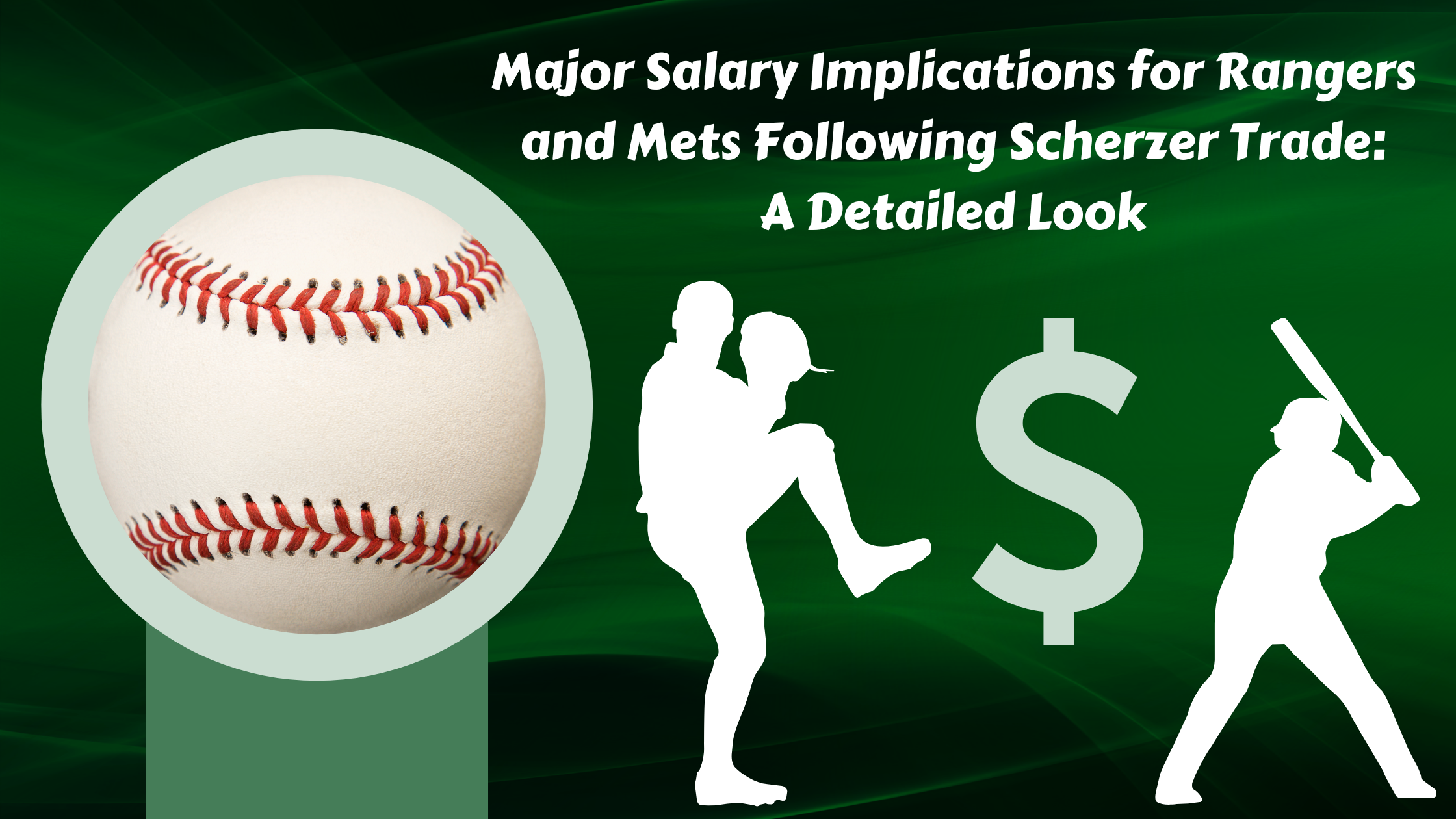Major Salary Implications for Rangers and Mets Following Scherzer Trade: A Detailed Look

REFERENCES AT THE END OF THIS POST
I wanted to build upon my past three articles where I cover more of the salary side of major professional American sports and this one centers around my favorite team, the New York Mets and their recent trade of future Hall of Famer Max Scherzer to the Texas Rangers.

Overview of the Proposed Scherzer Trade and Its Financial Implications
The recent blockbuster trade sending Max Scherzer from the New York Mets to the Texas Rangers carries major salary implications for both ballclubs. Let's break down the money involved and the potential pros and cons for the organizations and MLB as a whole.

Financials of the Trade: Rangers Take on Scherzer's Salary
As reported by MLB Network's Jon Heyman, the Rangers will pay Scherzer approximately $36 million to cover the remainder of his $43.3 million salary for 2023 and a portion of his $47.5 million 2024 salary, as Scherzer has agreed to opt into the final year of his contract rather than test free agency [1]. For the Rangers, bringing on Scherzer's contract is a major financial commitment but gives them an experienced ace as they aim for a Wild Card spot.

Potential Benefits and Risks for Rangers
Texas' opening day payroll was $145 million, 9th highest in MLB [2]. Adding over $30 million during the season is rare yet shows their win-now mindset. The move could excite fans and boost ticket sales, offsetting some of the added costs. There is risk however if Scherzer gets injured or sees a continued decline.

Financial Flexibility Gained for Mets by Trading Scherzer
For the Mets, trading Scherzer subtracts their highest-paid player from a payroll that ranks 2nd in MLB at $273 million [2]. Avoiding the remainder of his 2023 salary provides financial flexibility this season and next. New owner Steve Cohen has shown a willingness to spend big, but moving Scherzer's deal may indicate some desire for future budgetary caution.

Implications for MLB and Competitive Balance
For MLB, massive contracts like Scherzer's are major drivers of salary inflation across the sport. Trades like this also lead to debate about competitive balance. Large-market teams can more easily shoulder these gigantic contracts. Smaller-budget clubs can compete by trading for pricy stars mid-season [4]. But the system advantages big spenders, fueling arguments for measures like salary caps or floors [5].

Evaluating the Overall Impact of the Trade
Overall, the Scherzer trade makes sense for both contending ballclubs short-term. But the long-term ripple effects of moving massive veteran contracts between organizations with wildly disparate payrolls adds fuel to competitive balance concerns and larger economic debates surrounding MLB. Careful analysis is required to determine whether "buying" wins in this manner improves the game overall.

Historical Comparison: Similar Scope Trades in Recent Era
The proposed trade bears some resemblance to the 2009 trade involving the New York Yankees and Alex Rodriguez, whose contract was one of the biggest in the league at the time. The Yankees took on the remainder of Rodriguez's $275 million contract from the Texas Rangers, demonstrating a similar high-risk, high-reward strategy. While Rodriguez helped lead the Yankees to a World Series title, his contract, like Scherzer's, significantly impacted the club's payroll and sparked similar debates about competitive balance and salary caps [3].

References:
[1] Heyman, J. (2023). "Max Scherzer's Trade Details." Retrieved from https://twitter.com/JonHeyman/status/1553450784257302538
[2] Spotrac. (2023). "MLB Payroll Rankings." Retrieved from https://www.spotrac.com/mlb/payroll/
[3] Beyond the Box Score. (2019). "Age and the Decline of MLB Contracts." Retrieved from https://www.beyondtheboxscore.com/2019/12/3/20993134/mlb-free-agency-gerrit-cole-new-york-yankees-record-contract-age-decline-curse-opt-out
[4] FiveThirtyEight. (2023). "How Baseball’s Small-Budget Teams Can Still Compete With The Big Spenders." Retrieved from https://fivethirtyeight.com/features/how-baseballs-small-budget-teams-can-still-compete-with-the-big-spenders/
[5] Bleacher Report. (2023). "MLB Needs a Salary Cap." Retrieved from https://bleacherreport.com/articles/164119-mlb-needs-a-salary-cap

Three of my previous articles similar to this one:
The Evolving Landscape of MLB Salaries: A Balancing Act of Compensation
How Revenue Projections Impact the NBA Salary Cap
https://leofinance.io/@jimmy.adames/how-revenue-projections-impact-the-nba-salary-cap
The Costs and Rewards of the 2023 MLB Draft
https://leofinance.io/@jimmy.adames/the-costs-and-rewards-of-the-2023-mlb-draft
Posted Using LeoFinance Alpha
Posted Using LeoFinance Alpha
First of all, I loved the publication.
My favorite MLB team is the other great team from New York, but I don't want to polemicize in sports, but rather, I am grateful that publications like this are made, so that people understand how complicated financial transactions are in sports.
The salary cap and everything else that goes with it is something for another publication because it is something that is being violated in some soccer leagues, such as the English and Spanish clubs, but that is another topic.
Thank you very much for sharing. Happy week. Cheers and best regards.
First of all, I loved the publication.
My favorite MLB team is the other great team from New York, but I don't want to polemicize in sports, but rather, I am grateful that publications like this are made, so that people understand how complicated financial transactions are in sports.
The salary cap and everything else that goes with it is something for another publication because it is something that is being violated in some soccer leagues, such as the English and Spanish clubs, but that is another topic.
Thank you very much for sharing. Happy week. Cheers and best regards.
Very Much Appreciated 🙏🏼 @tonyes
Have a great week!
Thank you appreciated @Jimmy.adames.adames and wish you an excellent week to you and yours. Cheers and best regards.